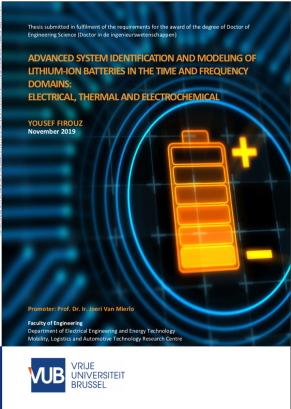
The main purpose of this thesis is to develop advanced and comprehensive modeling techniques and parametrization algorithms, regardless of the battery technology. Throughout this PhD research, lithium-ion batteries are subjected to state-of-the-art modeling and system identification methods. In this regard, batteries have been investigated from all aspects of modeling such as electrical, thermal and electrochemical and then, have been parametrized in the time and frequency domains. In the case of electrical models, it has been shown how identified parameters in the frequency domain can help to improve the model developed in the time domain. Thanks to the advanced characterization methods and modeling techniques in the frequency domain, such as multisine test and nonlinear block-oriented systems, the performance of electrical models has been remarkably improved. Furthermore, those methods reveal much more information from the nature of the system which cannot be achieved through conventional methods. In the case of thermal modeling, a detailed 1D model of a battery module has been developed and has been parametrized based on advanced methods developed in the frequency and time domains. And in the final chapter of the thesis, a multi-particle P2D model has been developed for all-solid-state lithium-ion batteries. This model can simulate the effects of ionic conductivity of solid electrolytes on the overall performance of the battery. Furthermore, the model can be used as a virtual testing lab to design and optimize a battery cell which leads to considerable cost and development time reductions.
